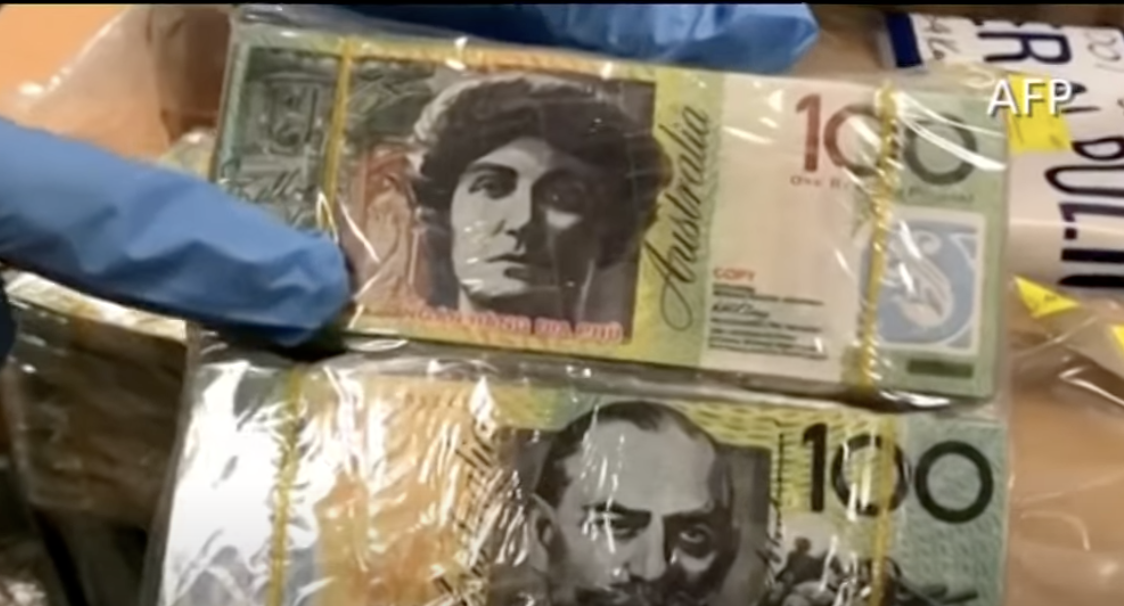
The ten reports of fake banknotes hitting Brisbane's Bayside shops might seem like a local problem, but it's actually part of a troubling national trend that's particularly targeting areas where older Australians shop and socialise.
Since late August, counterfeit $50 and $100 notes have been used to purchase fuel, groceries, and takeaway meals across Alexandra Hills, Birkdale, Capalaba, Cleveland, and Wynnum.
But since December last year (2024) police have recorded more than 80 counterfeit cash incidents in Canberra alone, while South Australia's Yorke Mid North region has seen multiple reports of counterfeit $100 and $50 notes being used between 21 August and 12 September.
The pattern is unmistakable: criminals are systematically targeting suburban shopping areas, service stations, and local businesses where staff might be busy and customers include seniors who frequently use cash for daily transactions.
'Alarmingly, the quality of fake notes is also increasing. The Royal Bank of Australia (RBA) graded 40 per cent of the counterfeit notes it received as 'good to excellent.''
A nationwide concern hiding in plain sight
While counterfeiting in Australia has been steadily declining since its peak in 2015, recent regional clusters suggest criminals are adapting their tactics. The Bank received around 17,000 counterfeits in 2021 with a total value of just over $1,300,000 [4], representing just 9 ppm—much lower than the 2015 rate of 27 ppm [5].
The Brisbane incidents reveal sophisticated methods: inspections of the counterfeit notes show it to be printed in varied quality, with some stating the word 'COPY' with various serial numbers. Notes have been printed on paper, plastic or cardboard [6]. Police warn that people may try to present these to businesses during a busy time, or they may ask for the note to be exchanged for smaller notes [7].
What's particularly concerning for regular cash users is the improving quality. The $50 note continues to be the most counterfeited denomination [8], and criminals are getting better at their craft.
Know your polymer: Australia's security advantage
Australia pioneered polymer banknotes precisely to combat counterfeiting, and understanding these features could save you from financial loss.
In 1988, the Reserve Bank of Australia released the world's first long-lasting and counterfeit-resistant polymer (plastic) banknotes. In 1996, Australia became the first country to have a full series of circulating polymer banknotes.
Australian polymer banknote security features
• Clear window that's part of the note (not stuck on)
• White image in the window that can't be rubbed off
• Raised printing you can feel with your fingertip
• Polymer material that springs back when scrunched
• Signatures positioned correctly (Governor above Secretary to Treasury since 2002)
• Serial numbers that match the printing year
The simplest test anyone can perform is the 'scrunch test.' Try scrunching the banknote in your hand—a genuine banknote should spring back. You can also check that the clear window is part of the banknote as opposed to addition and that the white image on the window cannot easily be rubbed off.
Police recommend that anyone accepting money check the texture of the note, other in-built security features and printing. To determine if a suspect note is counterfeit, it is best to compare it with a note that is known to be genuine.
When shopping: your defence strategies
The timing of these incidents isn't coincidental. This recent increase can potentially be attributed to fraudsters taking every opportunity to run through their supply of counterfeit notes as we shift away from cash payments and capitalising on low staff familiarity with counterfeit detection. In the lead-up to the busy Christmas shopping season, this is prime time for counterfeit notes to pass through without detection as staff don't have the time to check.
Source: 7NEWS Australia / Youtube/
For seniors who prefer cash transactions, extra vigilance during busy shopping periods becomes crucial. Look out for customers who seem nervous, insist on quick transactions, or specifically request change for large denomination notes.
Protecting yourself from counterfeit cash
- Feel the note—genuine polymer has a distinctive texture and springs back when scrunched
- Check the clear window is integral to the note, not stuck on
- Compare with a known genuine note if in doubt
- Be extra cautious during busy periods or when someone seems rushed
- Remember: if it feels wrong, you can refuse to accept it (if safe to do so)
What happens if you're caught out
The harsh reality is that counterfeits have no value—you will not be reimbursed. Retailers need to be aware that counterfeit notes have no value. If they are banked, financial institutions will simply deduct the amount from your account—you will not be reimbursed.
This makes prevention absolutely critical. There's no safety net if you accept a fake note in good faith—the financial loss is yours to bear.
If you encounter a suspected counterfeit
Should you come across a suspicious note, the procedure is straightforward but important to follow correctly. Handle the suspect banknote as little as possible and store it in an envelope. Note any relevant information, such as how it came into your possession. Report the matter immediately to State or Federal police.
If you suspect that currency is counterfeit, you can refuse to accept it (as long as it is safe to do so). Don't feel pressured to complete a transaction if something doesn't feel right.
For reporting, you can contact Policelink by providing information using the online suspicious activity form 24hrs per day at www.police.qld.gov.au/reporting or call 131 444. Report crime information anonymously via Crime Stoppers. Call 1800 333 000 or report online at www.crimestoppersqld.com.au.
Community vigilance matters
While the overall trend shows counterfeiting declining, these regional clusters prove that criminals are adapting and specifically targeting local shopping areas. The Brisbane Bayside incidents, combined with similar reports from Canberra and South Australia, suggest an organised approach that relies on busy environments and rushed transactions.
Did you know?
Did you know?
Australia's polymer banknotes are now used by 24 countries worldwide, making our currency technology one of the most widely adopted anti-counterfeiting innovations in the world. The technology was developed right here and continues to be manufactured by Note Printing Australia.
Your awareness and willingness to take an extra moment to check your cash could be the difference between a successful scam and a failed attempt. Don't let politeness or embarrassment prevent you from protecting yourself—any legitimate business will understand and appreciate customers who take care with their money.
Have you encountered any suspicious banknotes in your area recently, or do you have tips for spotting fakes that have served you well over the years? Share your experiences in the comments below to help fellow members stay vigilant.
Original Article
https://www.news.com.au/national/qu...74a6f7bb35fdd8e85ac4c0b78e9dae?from=rss-basic
Counterfeit currency circulating Canberra | ACT Policing
Cited text: Since December last year (2024) police have recorded more than 80 counterfeit cash incidents, with the most recent occurring last week (Thursday, 14 A...
Excerpt: since December last year (2024) police have recorded more than 80 counterfeit cash incidents
https://police.act.gov.au/news/2025-media-releases/august/counterfeit-currency-circulating-canberra
SAPOL—Fake notes circulating in Yorke Mid North region
Cited text: There have been multiple reports of counterfeit $100 and $50 notes being used between 21 August and 12 September to purchase various items at service ...
Excerpt: multiple reports of counterfeit $100 and $50 notes being used between 21 August and 12 September
https://www.police.sa.gov.au/sa-pol...e-notes-circulating-in-yorke-mid-north-region
Recent Trends in Banknote Counterfeiting | Bulletin—June 2022 | RBA
Cited text: Counterfeiting in Australia has been steadily declining since its peak in 2015.
Excerpt: counterfeiting in Australia has been steadily declining since its peak in 2015
https://www.rba.gov.au/publications/bulletin/2022/jun/recent-trends-in-banknote-counterfeiting.html
Recent Trends in Banknote Counterfeiting | Bulletin—June 2022 | RBA
Cited text: The Bank received around 17,000 counterfeits in 2021 with a total value of just over $1,300,000.
Excerpt: The Bank received around 17,000 counterfeits in 2021 with a total value of just over $1,300,000
https://www.rba.gov.au/publications/bulletin/2022/jun/recent-trends-in-banknote-counterfeiting.html
Recent Trends in Banknote Counterfeiting | Bulletin—June 2022 | RBA
Cited text: The counterfeiting rate, which is expressed as the number of counterfeits per million genuine banknotes in circulation (parts per million, or ppm), is...
Excerpt: 9 ppm—much lower than the 2015 rate of 27 ppm
https://www.rba.gov.au/publications/bulletin/2022/jun/recent-trends-in-banknote-counterfeiting.html
Counterfeit money, Brisbane’s south—Centenary
Cited text: Inspections of the counterfeit notes (pictured) show it to be printed in varied quality, with some stating the word ‘COPY’ with various serial numbers...
Excerpt: inspections of the counterfeit notes show it to be printed in varied quality, with some stating the word 'COPY' with various serial numbers.
https://mypolice.qld.gov.au/centenary/2025/09/25/counterfeit-money-brisbanes-south/
Counterfeit money, Brisbane’s south—Centenary
Cited text: People may try to present these to businesses during a busy time, or they may ask for the note to be exchanged for smaller notes.
Excerpt: people may try to present these to businesses during a busy time, or they may ask for the note to be exchanged for smaller notes
https://mypolice.qld.gov.au/centenary/2025/09/25/counterfeit-money-brisbanes-south/
Look out for counterfeit cash this Christmas season | NRA
Cited text: The $50 note continues to be the most counterfeited denomination.
Excerpt: The $50 note continues to be the most counterfeited denomination
https://www.nationalretail.org.au/look-out-for-counterfeit-cash-this-christmas-season/
Counterfeit money—Wikipedia
Cited text: In 1988, the Reserve Bank of Australia released the world's first long-lasting and counterfeit-resistant polymer (plastic) banknotes with a special Bi...
Excerpt: In 1988, the Reserve Bank of Australia released the world's first long-lasting and counterfeit-resistant polymer (plastic) banknotes.
https://en.wikipedia.org/wiki/Counterfeit_money
Counterfeit money—Wikipedia
Cited text: In 1996, Australia became the first country to have a full series of circulating polymer banknotes.
Excerpt: In 1988, the Reserve Bank of Australia released the world's first long-lasting and counterfeit-resistant polymer (plastic) banknotes.
https://en.wikipedia.org/wiki/Counterfeit_money
Look out for counterfeit cash this Christmas season | NRA
Cited text: One of the easiest ways to check a note is genuine is the “scrunch test.” Try scrunching the banknote in your hand—a genuine banknote should spring ...
Excerpt: Try scrunching the banknote in your hand—a genuine banknote should spring back
https://www.nationalretail.org.au/look-out-for-counterfeit-cash-this-christmas-season/
Look out for counterfeit cash this Christmas season | NRA
Cited text: You can also check that the clear window is part of the banknote as opposed to addition and that the white image on the window cannot easily be rubbed...
Excerpt: You can also check that the clear window is part of the banknote as opposed to addition and that the white image on the window cannot easily be rubbed off
https://www.nationalretail.org.au/look-out-for-counterfeit-cash-this-christmas-season/
SAPOL—Fake notes circulating in Yorke Mid North region
Cited text: Police recommend that anyone accepting money check the texture of the note, other in-built security features and printing. To determine if a suspect n...
Excerpt: Police recommend that anyone accepting money check the texture of the note, other in-built security features and printing.
https://www.police.sa.gov.au/sa-pol...e-notes-circulating-in-yorke-mid-north-region
Look out for counterfeit cash this Christmas season | NRA
Cited text: This recent increase can potentially be attributed to fraudsters taking every opportunity to run through their supply of counterfeit notes as we shift...
Excerpt: This recent increase can potentially be attributed to fraudsters taking every opportunity to run through their supply of counterfeit notes as we shift away from cash payments and capitalising on low staff familiarity with counterfeit…
https://www.nationalretail.org.au/look-out-for-counterfeit-cash-this-christmas-season/
RBA Banknotes: Counterfeit Detection Guide
Cited text: It is important to note that counterfeits have no value—you will not be reimbursed.
Excerpt: counterfeits have no value—you will not be reimbursed
https://banknotes.rba.gov.au/counterfeit-detection/counterfeit-detection-guide/
Look out for counterfeit cash this Christmas season | NRA
Cited text: The Royal Bank of Australia (RBA) graded 40 per cent of the counterfeit notes it received as “good to excellent.” · Retailers need to be aware that counterfei...
Excerpt: Retailers need to be aware that counterfeit notes have no value. If they are banked, financial institutions will simply deduct the amount from your account—you will not be reimbursed
https://www.nationalretail.org.au/look-out-for-counterfeit-cash-this-christmas-season/
Counterfeit money, Brisbane’s south—Centenary
Cited text: If you come across a banknote that you suspect is counterfeit, take the following steps: Handle the suspect banknote as little as possible and store i...
Excerpt: Handle the suspect banknote as little as possible and store it in an envelope. Note any relevant information, such as how it came into your possession.
https://mypolice.qld.gov.au/centenary/2025/09/25/counterfeit-money-brisbanes-south/
Counterfeit currency in Australia—AFP
Cited text: If you suspect that currency is counterfeit, you can refuse to accept it (as long as it is safe to do so).
Excerpt: If you suspect that currency is counterfeit, you can refuse to accept it (as long as it is safe to do so)
https://www.afp.gov.au/crimes/money-laundering-and-financial-crime/counterfeit-currency
Counterfeit money, Brisbane’s south—Centenary
Cited text: If you have information for police, contact Policelink by providing information using the online suspicious activity form 24hrs per day at www.police....
Excerpt: contact Policelink by providing information using the online suspicious activity form 24hrs per day at www.police.qld.gov.au/reporting or call 131 444
https://mypolice.qld.gov.au/centenary/2025/09/25/counterfeit-money-brisbanes-south/
Counterfeit money, Brisbane’s south—Centenary
Cited text: Report crime information anonymously via Crime Stoppers. Call 1800 333 000 or report online at www.crimestoppersqld.com.au.
Excerpt: Report crime information anonymously via Crime Stoppers. Call 1800 333 000 or report online at www.crimestoppersqld.com.au
https://mypolice.qld.gov.au/centenary/2025/09/25/counterfeit-money-brisbanes-south/








